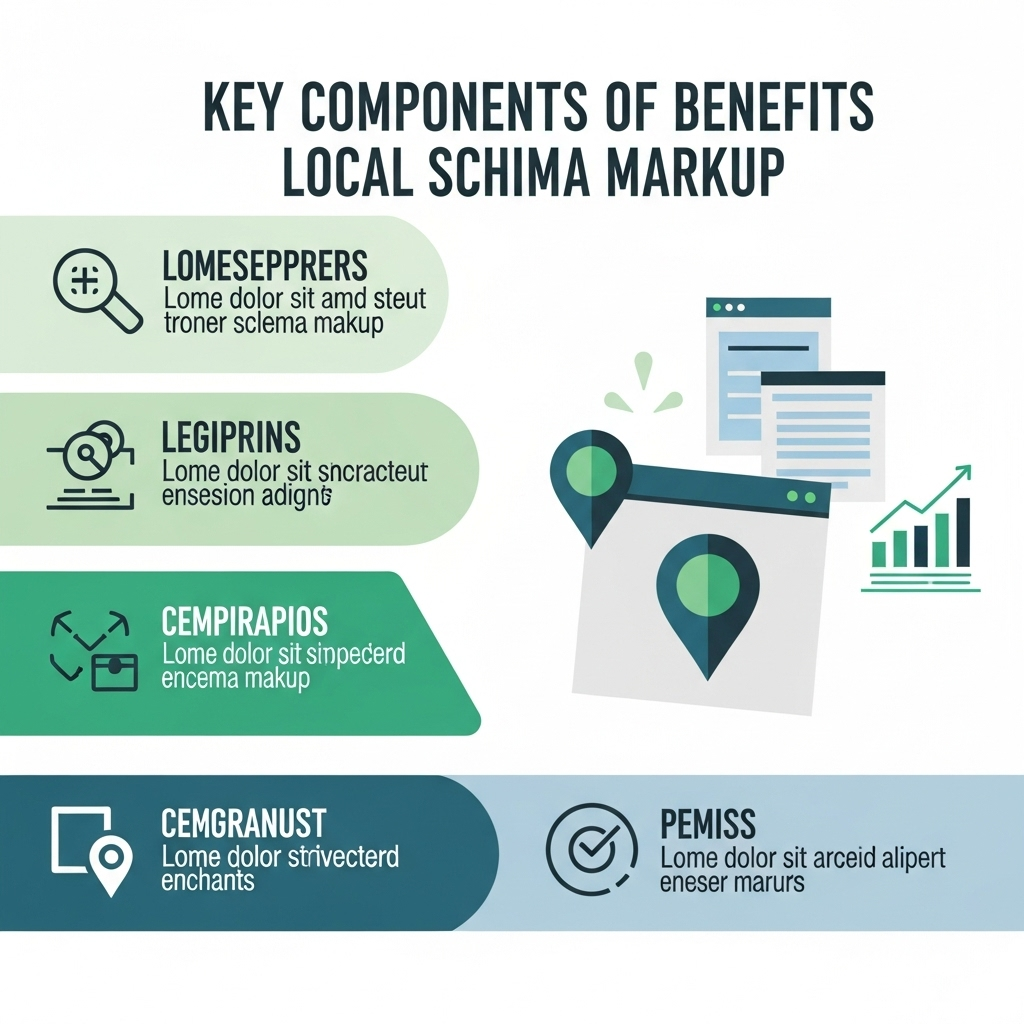
Hey there, fellow business owners and digital marketing enthusiasts!
Have you ever wondered how some local businesses seem to magically appear at the top of Google’s search results, complete with star ratings, opening hours, and even a direct link to their booking page?
It’s not magic, my friends. It’s the power of local schema markup, and today, we’re going to pull back the curtain and reveal its secrets.
I remember when I first stumbled upon the concept of schema markup. It sounded like something out of a sci-fi movie, a complex code only accessible to the most seasoned developers.
But as I delved deeper, I realized it’s actually a powerful, yet surprisingly accessible, tool that can dramatically impact your local search visibility.
Think of it as giving Google a direct, clear instruction manual about your business. And trust me, Google loves instruction manuals.
What Exactly Is Local Schema Markup?
In simple terms, schema markup is a form of structured data that you add to your website’s HTML.
It helps search engines understand the context of your content.
While there are many types of schema, local schema markup (specifically,
the `LocalBusiness` schema type from Schema.org) is designed to provide detailed information about a physical business location.
Imagine Google as a super-smart librarian.
Without schema markup, your website is like a book without a proper title, author, or genre listed.
The librarian might eventually figure out what it’s about, but it’ll take time and effort.
With local schema markup, you’re essentially putting a perfectly organized index card on your book,
telling the librarian exactly what your business is, where it’s located,
what services it offers, and so much more.
This makes it incredibly easy for Google to categorize and display your business information accurately in search results, especially for local queries.

Videos are added as random thoughts 💭 💭 💭
Why Local Schema Markup Isn’t Just a ‘Nice-to-Have’ – It’s a Must-Have!
So, why should you care about this technical-sounding thing called local schema markup?
The answer is simple: visibility. In today’s hyper-local search landscape, if you’re not using schema, you’re essentially leaving money on the table.
Here’s why it’s a game-changer:
Enhanced Visibility in Local Search Results: When someone searches for a product or service ‘near me,’ Google prioritizes local businesses.
Schema markup helps Google understand that your business is relevant to these local searches, increasing your chances of appearing in the coveted ‘local pack’ – that map-based result with three businesses at the top of the search page.
Rich Snippets and Knowledge Panels: Ever noticed those extra bits of information under a search result, like star ratings, opening hours, or even a direct booking link?
Those are called rich snippets, and they’re often powered by schema markup.
They make your listing stand out, attracting more clicks and giving users valuable information at a glance.
For local businesses, this can also lead to a prominent Knowledge Panel on the right side of the search results, showcasing all your essential business details.
Improved Click-Through Rates (CTR): When your search listing is more informative and visually appealing, users are more likely to click on it.
This increased CTR signals to Google that your website is valuable, potentially boosting your organic rankings even further.
Voice Search Optimization: With the rise of voice assistants like Siri, Alexa, and Google Assistant, local searches are increasingly conversational.
Schema markup helps these assistants understand your business details, making it easier for them to recommend your business when someone asks, ‘Hey Google, find me a coffee shop near me.’
Competitive Advantage: While schema markup is becoming more common, many local businesses still aren’t fully leveraging its power.
By implementing it, you gain a significant edge over your competitors who are missing out on these benefits.
Common Local Schema Markup Properties and Examples
Now, let’s get to the nitty-gritty: what information can you include in your local schema markup?
Schema.org provides a vast vocabulary, but for local businesses, some properties are more crucial than others.
Here are some of the most common and impactful ones, along with simplified examples:
1. Business Name (`name`)
This is straightforward: the official name of your business.
“name“: “The Daily Grind Coffee Shop”
“`
2. Address (`address`)
Your physical street address. This is critical for local search.
“`json
“address”: {
“@type”: “PostalAddress”,
“streetAddress”: “123 Main St”,
“addressLocality”: “Anytown”,
“addressRegion”: “CA”,
“postalCode”: “90210”,
“addressCountry”: “US”
}
3. Phone Number (`telephone`)
Your primary contact number, often displayed directly in search results.
“`json
“telephone”: “+1-555-123-4567”
4. Opening Hours (`openingHoursSpecification`)
Specify your business hours for each day of the week.
This helps customers know when you’re open.
“`json
“openingHoursSpecification”: [
{
“@type”: “OpeningHoursSpecification”,
“dayOfWeek”: [
“Monday”,
“Tuesday”,
“Wednesday”,
“Thursday”,
“Friday”
],
“opens”: “07:00”,
“closes”: “18:00”
},
{
“@type”: “OpeningHoursSpecification”,
“dayOfWeek”: [
“Saturday”,
“Sunday”
],
“opens”: “08:00”,
“closes”: “16:00”
}
]
“`
5. Geo-coordinates (`geo`)
Latitude and longitude of your business location. This helps with map-based searches.
“`json
“geo”: {
“@type”: “GeoCoordinates”,
“latitude”: “34.052235”,
“longitude”: “-118.243683”
}
“`
6. Price Range (`priceRange`)
An indication of your business’s price level (e.g., $, $$, $$$).
“`json
“priceRange”: “$$”
“`
### 7. Aggregate Rating (`aggregateRating`)
If you collect reviews, you can display your average rating and the number of reviews.
“`json
“aggregateRating”: {
“@type”: “AggregateRating”,
“ratingValue”: “4.8”,
“reviewCount”: “120”
}
“`
8. Image (`image`)
A URL to a representative image of your business.
“`json
“image”: “https://www.yourcoffeeshop.com/images/coffeeshop-front.jpg”
“`
9. URL (`url`)
The URL of your business’s website.
“`json
“url”: “https://www.yourcoffeeshop.com”
“`
10. Same As (`sameAs`)
Links to your social media profiles or other official online presences. This helps Google connect all your brand’s digital footprints.
“`json
“sameAs”: [
“https://www.facebook.com/yourcoffeeshop”,
“https://www.instagram.com/yourcoffeeshop”,
“https://twitter.com/yourcoffeeshop”
]
“`
Putting It All Together (Simplified Example)
Here’s how a basic `LocalBusiness` schema might look when implemented on your website (typically in the `<head>` section or `<body>` using JSON-LD):
“`json
<script type=”application/ld+json”>
{
“@context”: “http://schema.org”,
“@type”: “LocalBusiness”,
“name”: “The Daily Grind Coffee Shop”,
“image”: “https://www.yourcoffeeshop.com/images/coffeeshop-front.jpg”,
“url”: “https://www.yourcoffeeshop.com”,
“telephone”: “+1-555-123-4567”,
“priceRange”: “$$”,
“address”: {
“@type”: “PostalAddress”,
“streetAddress”: “123 Main St”,
“addressLocality”: “Anytown”,
“addressRegion”: “CA”,
“postalCode”: “90210”,
“addressCountry”: “US”
},
“geo”: {
“@type”: “GeoCoordinates”,
“latitude”: “34.052235”,
“longitude”: “-118.243683”
},
“openingHoursSpecification”: [
{
“@type”: “OpeningHoursSpecification”,
“dayOfWeek”: [
“Monday”,
“Tuesday”,
“Wednesday”,
“Thursday”,
“Friday”
],
“opens”: “07:00”,
“closes”: “18:00”
},
{
“@type”: “OpeningHoursSpecification”,
“dayOfWeek”: [
“Saturday”,
“Sunday”
],
“opens”: “08:00”,
“closes”: “16:00”
}
],
“sameAs”: [
“https://www.facebook.com/yourcoffeeshop”,
“https://www.instagram.com/yourcoffeeshop”,
“https://x.com/yourcoffeeshop”
]
}
</script>
“`
Remember, this is a simplified example. Depending on your business type (e.g., restaurant, doctor, salon), there are even more specific schema types and properties you can use to provide even richer details.
Always refer to Schema.org and Google’s official documentation for the most up-to-date and comprehensive guidelines.
How to Implement Local Schema Markup
Implementing local schema markup might sound daunting, but it’s more accessible than you think. Here are the general steps:
1. Identify Your Business Type: Start by finding the most specific `LocalBusiness` type on Schema.org that matches your business (e.g., `Restaurant`, `Dentist`, `AutomotiveRepair`).
2. Gather Your Information: Collect all the relevant details about your business: name, address, phone number, hours, services, etc.
3.Generate Your JSON-LD: You can manually write the JSON-LD code based on the examples above, or use a schema markup generator tool.
Many SEO tools and websites offer free schema generators that simplify this process.
4. Add to Your Website: The most common and recommended method is to add the JSON-LD script to the `<head>` section of your website.
If you’re using a content management system (CMS) like WordPress, there are plugins (e.g., Yoast SEO Premium, Schema Pro) that can help you implement schema without touching code.
5. Test Your Markup: This is crucial! Use Google’s Rich Results Test tool to ensure your schema markup is correctly implemented and eligible for rich results.
This tool will highlight any errors or warnings.
6. Monitor Performance: Keep an eye on your Google Search Console reports.
You’ll be able to see if Google is picking up your structured data and if it’s leading to any rich results or enhanced visibility.
My Personal Takeaway: Don’t Overlook the Details
I’ve seen firsthand how a seemingly small detail like schema markup can make a monumental difference in a local business’s online presence.
It’s not about tricking Google; it’s about helping Google understand your business better so it can connect you with the right customers.
It’s about ensuring that when someone nearby is looking for exactly what you offer, your business is not just found, but stands out.
So, if you haven’t already, make local schema markup a priority for your business.
It’s an investment that pays div
idends in visibility, traffic, and ultimately, new customers walking through your door (or clicking through to your website).
